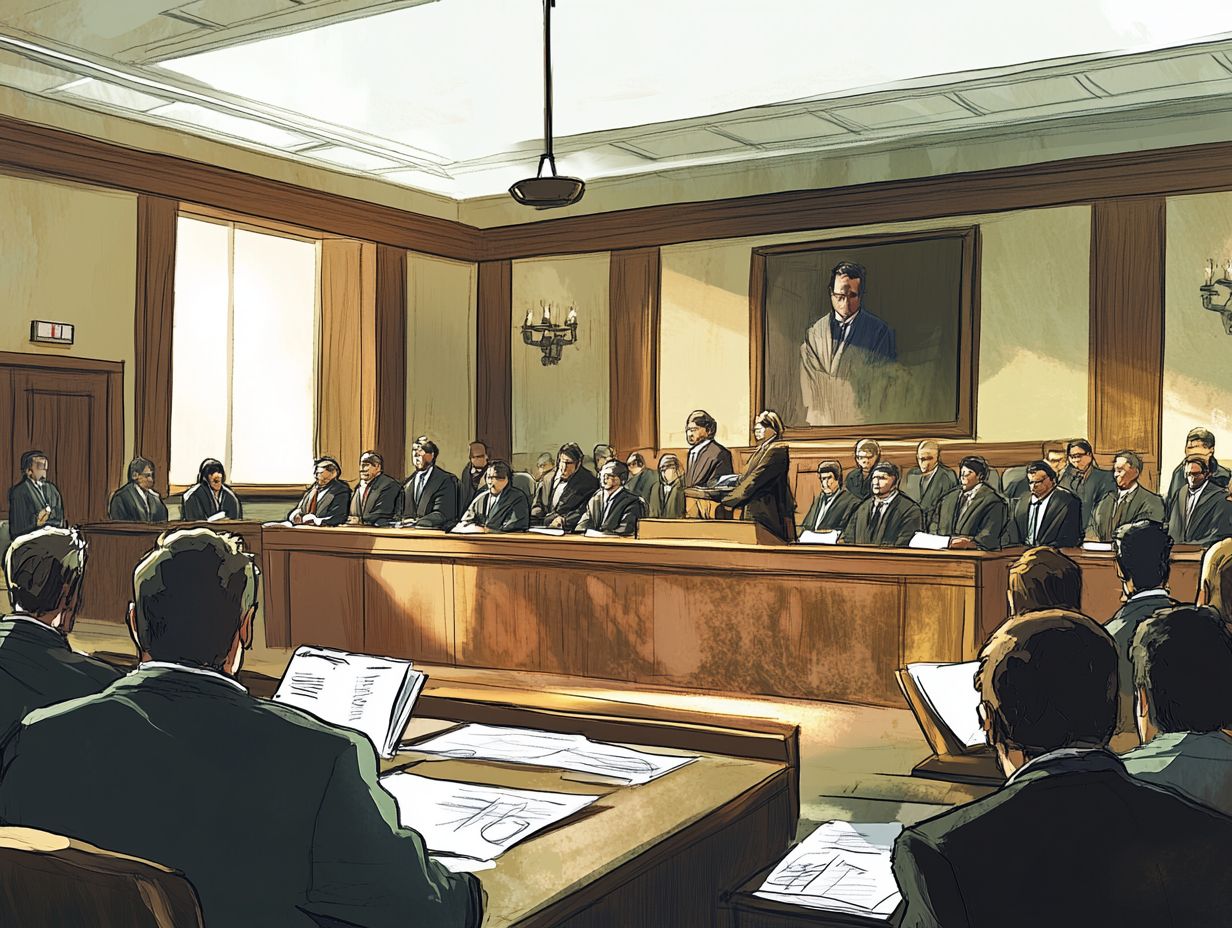Using Psychological Evaluations in Defense
Psychological evaluations are crucial in legal defense. They provide insights into a defendant’s mental state and motivations.
These evaluations yield vital evidence and expert testimony. This can significantly affect a case’s outcome.
However, the process has challenges, particularly related to reliability and potential bias. This article explores the different types of psychological evaluations used in defense, highlighting their benefits while navigating inherent complexities.
Contents
- Key Takeaways:
- Benefits of Using Psychological Evaluations in Defense
- Types of Psychological Evaluations Used in Defense
- The Process of Conducting a Psychological Evaluation
- Challenges and Controversies Surrounding Psychological Evaluations in Defense
- Preguntas Frecuentes
- 1. Cu l es el prop sito de utilizar evaluaciones psicol gicas en la defensa?
- 2. Qui n puede solicitar una evaluaci n psicol gica en la defensa?
- 3. Qu implica una evaluaci n psicol gica en la defensa?
- 4. C mo puede beneficiar una evaluaci n psicol gica la estrategia de defensa?
- 5. Las evaluaciones psicol gicas en la defensa son siempre admisibles en el tribunal?
- 6. Existen posibles inconvenientes al usar evaluaciones psicol gicas en la defensa?
Key Takeaways:

Psychological evaluations provide valuable evidence and expert testimony to support a defendant’s case. By understanding the defendant’s mental state, these evaluations can help determine if the defendant is competent to stand trial or if an insanity defense is applicable. Despite potential challenges and controversies, psychological evaluations remain an important tool for gathering crucial information and presenting a stronger defense.
What are Psychological Evaluations?
Psychological evaluations are systematic assessments performed by mental health professionals. They explore an individual’s psychological state, especially in forensic psychology contexts within the criminal justice system.
These evaluations uncover insights about defendants’ competencies, mental health disorders, and potential criminal responsibility. They are essential for determining a defendant’s capacity to stand trial and evaluating conditions like mental illness or faking illness.
Psychological evaluations utilize various assessment methods, including clinical interviews, standardized tests, and behavioral analyses. Together, these approaches create a comprehensive picture of an individual’s psychological history.
The interpretation of these evaluations often relies on expert witnesses. Their testimony clarifies assessment results and helps demystify complex psychological concepts for judges and juries.
These evaluations are vital in addressing key issues, such as a defendant’s intent during a crime or their understanding of legal proceedings. This understanding directly influences court decisions, sentencing, and the administration of justice.
Benefits of Using Psychological Evaluations in Defense
Psychological evaluations offer many benefits in defense cases. They help clarify a defendant’s understanding of legal proceedings.
These evaluations provide thorough insights into a defendant’s mental state, essential for determining competency to stand trial and assessing potential for rehabilitation.
These assessments also help craft effective legal strategies that consider defendants’ mental health, ultimately impacting sentencing considerations and judicial outcomes.
Supporting Evidence and Expert Testimony
In legal cases, the weight of supporting evidence often rests on psychological evaluations performed by qualified professionals. Their expert testimony can significantly influence the court’s decisions regarding a defendant’s mental state and criminal responsibility.
The insights these experts provide are crucial for establishing the defendant’s psychological profile and ensuring that essential legal standards like the criteria for competency and sanity are meticulously met.
Given the complex nature of mental health issues, courts rely heavily on these evaluations to navigate the often murky waters of psychological assessments. Expert witnesses, who typically possess advanced degrees and specialized training in forensic psychology, collaborate with legal teams to present informed opinions that align with accepted clinical practices.
As they share their findings, they illuminate the nuances of mental health issues for judges and juries, promoting well-informed and equitable judicial outcomes. This expert testimony can leave a lasting mark on case law, setting precedents for how mental health factors are addressed within the legal system.
Understanding these evaluations can make all the difference in a trial. Explore more about psychological evaluations and their impact in legal settings.
Understanding the Defendant’s Mental State

Understanding your mental state is crucial in legal proceedings. It directly influences your competency to stand trial and the evaluation of your criminal responsibility. A solid grasp of mental illness, including serious mental health issues or diagnosable conditions, helps legal professionals assess factors that could shape your criminal behavior and intent.
This often involves thorough psychological evaluations that explore your psychological history and current mental health status. These evaluations are essential for crafting an effective legal defense.
The insights gained from these evaluations inform defense strategies and shape the court’s perceptions of culpability. Conditions like anxiety disorders, mood disorders, or psychosis can dramatically alter how your actions are interpreted, especially if those conditions affect your decision-making abilities at the time of the offense.
Forensic psychologists play a pivotal role in clarifying these complexities. They bridge the divide between legal frameworks and psychological realities. Their expertise helps outline suitable behavioral interventions and highlights the need for rehabilitation rather than punitive measures in some instances.
Understanding mental health in the legal context can dramatically shape outcomes, ensuring that justice aligns with the psychological realities of each individual case.
Types of Psychological Evaluations Used in Defense
What types of psychological evaluations are vital in legal defense? You will encounter various evaluations designed to address specific legal questions and concerns related to a defendant’s mental health.
Competency evaluations play a crucial role, assessing a defendant’s capacity to comprehend and engage in legal proceedings. Insanity defense evaluations are also essential; they determine whether the defendant meets the necessary criteria for an insanity defense, such as those outlined in the M’Naghten standard.
These evaluations involve thorough psychological testing and mental health assessments, ensuring that judicial proceedings are accurate and equitable.
Competency Evaluations
Competency evaluations are a key aspect of forensic psychology. They assess your ability to understand the judicial proceedings you face and to assist in your own defense.
Conducted under strict judicial criteria, these evaluations can significantly impact your legal journey. They influence whether you are deemed fit to stand trial and affect the overall judicial process. The insights gained from these evaluations are instrumental in determining if you have the mental capacity required for a fair trial.
To conduct these assessments effectively, mental health professionals need specialized training in psychological evaluation and legal standards. The process typically includes:
- Clinical interviews
- Standardized psychological tests
- Gathering collateral information from family members or legal representatives
Throughout this thorough evaluation, they analyze your cognitive functions, emotional understanding, and behavioral patterns to assess your competency.
Once the evaluation concludes, the results are meticulously documented in a report presented to the court. This report outlines the methodologies used and the conclusions drawn, ensuring that legal decision-makers have the essential information to evaluate your fitness for trial while upholding the integrity of the judicial system.
If you or someone you know is facing legal challenges, understanding mental health evaluations is crucial!
Insanity Defense Evaluations
Insanity defense evaluations are assessments that determine if someone’s mental disorder affects their criminal responsibility. They follow standards like the M’Naghten rule.
These evaluations are critical in court. They shape legal strategies and judicial decisions.
Mental health professionals, such as psychologists and psychiatrists, conduct these assessments. They analyze your mental condition and whether you understand your actions.
This process helps the court understand your mental state. It links legal responsibilities with psychological conditions.
Ultimately, these evaluations are essential in forensic psychology. They highlight the collaboration between legal and mental health systems to achieve fair outcomes.
The Process of Conducting a Psychological Evaluation

Conducting a psychological evaluation involves structured steps to gather information about a defendant’s mental health. This careful approach ensures reliable court evaluations.
The process starts with preliminary interviews and then includes psychological testing.
Finally, you compile the findings into a clear report. This report can be crucial as expert testimony during court proceedings.
Steps and Procedures
The steps for conducting psychological evaluations follow a systematic approach. This ensures every relevant aspect of a defendant’s mental health is assessed.
The process begins with an initial interview to gather background information. This is followed by specific psychological assessments tailored to the individual.
During the initial interview, clinicians have a detailed conversation about your history and mental state. They explore any psychological symptoms you may have.
Next, standardized tests measure cognitive abilities and emotional responses. This provides a scientific basis for the conclusions drawn.
Once evaluations are finished, assessors create a comprehensive report. This report details test results and observations for reliability.
The recommendations in the report provide valuable insights for legal counsel. They highlight potential defenses or mitigating circumstances in legal proceedings.
Challenges and Controversies Surrounding Psychological Evaluations in Defense
Psychological evaluations are essential in legal defenses but face challenges regarding reliability and biases.
The subjective nature of these tests raises concerns about accuracy. There’s also the risk of individuals manipulating results.
These issues underscore the importance of strict standards in forensic psychology to maintain the integrity of the legal process.
Reliability and Bias
Reliability and bias are crucial when it comes to psychological evaluations, as they significantly influence the legitimacy and outcomes of expert testimony in court.
Bias can arise from various sources, such as evaluator subjectivity or external pressures. These factors can compromise the objectivity of assessments. Make sure evaluations are reliable to uphold the integrity of forensic psychology and provide accurate representations of defendants mental states during judicial proceedings.
When evaluators approach assessments with fixed ideas or unnoticed biases, the risk of drawing inaccurate conclusions increases, which can ultimately impact critical legal decisions.
To enhance reliability, consider adopting standard tests and structured interviews. This is crucial for minimizing variability in evaluation processes, leading to a more consistent approach in assessing psychological conditions.
Incorporating peer reviews and training in cultural competence can help evaluators recognize their biases and reduce their influence. This multifaceted strategy not only strengthens the validity of assessments but also reinforces the credibility of expert testimony, guiding legal outcomes with greater fairness.
Preguntas Frecuentes

1. Cu l es el prop sito de utilizar evaluaciones psicol gicas en la defensa?
Las evaluaciones psicol gicas en la defensa ayudan a comprender mejor el estado mental de un individuo y pueden ser utilizadas para apoyar su defensa en procedimientos legales.
2. Qui n puede solicitar una evaluaci n psicol gica en la defensa?
El acusado, su abogado, la fiscal a o el tribunal pueden solicitar una evaluaci n psicol gica en la defensa.
3. Qu implica una evaluaci n psicol gica en la defensa?
Una evaluaci n psicol gica en la defensa generalmente implica pruebas psicol gicas, entrevistas y observaciones para evaluar la salud mental y el funcionamiento del individuo.
4. C mo puede beneficiar una evaluaci n psicol gica la estrategia de defensa?
Una evaluaci n psicol gica puede proporcionar informaci n valiosa sobre el estado mental de un individuo y cualquier factor subyacente que pudo haber influido en su comportamiento. Esta informaci n puede ser utilizada para construir una estrategia de defensa m s s lida y mitigar la gravedad de los cargos.
5. Las evaluaciones psicol gicas en la defensa son siempre admisibles en el tribunal?
No, la admisibilidad de una evaluaci n psicol gica en el tribunal es determinada por el juez. La evaluaci n debe cumplir con ciertos criterios, como ser realizada por un profesional calificado y ser relevante para el caso.
6. Existen posibles inconvenientes al usar evaluaciones psicol gicas en la defensa?
Si bien las evaluaciones psicol gicas pueden ser beneficiosas, existen inconvenientes potenciales, como el costo de la evaluaci n y la posibilidad de que la informaci n se use en contra del acusado. Es importante considerar estos factores antes de buscar una evaluaci n psicol gica en la defensa.






